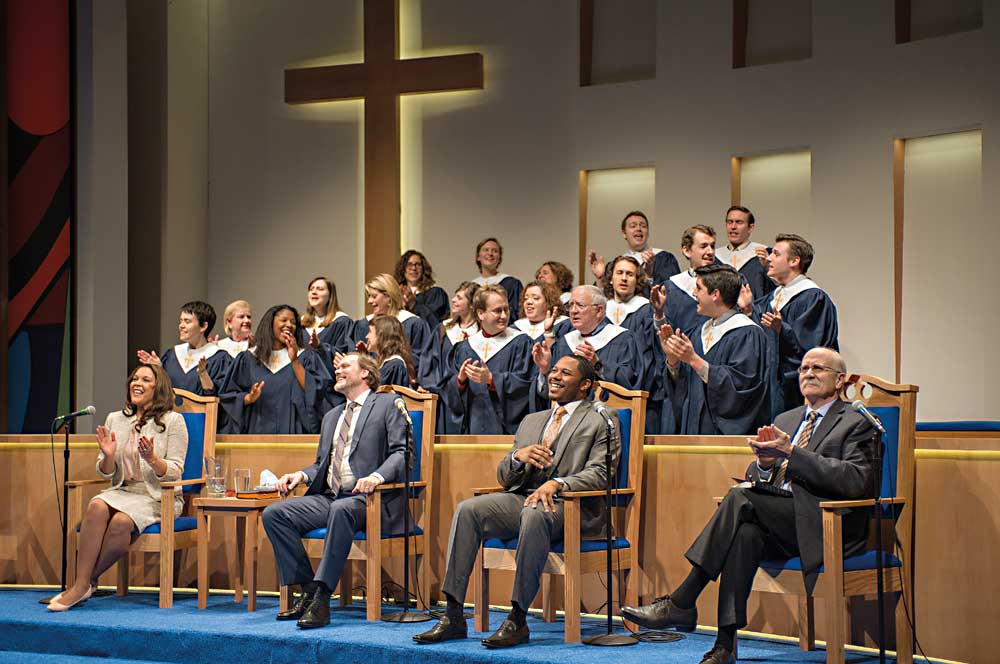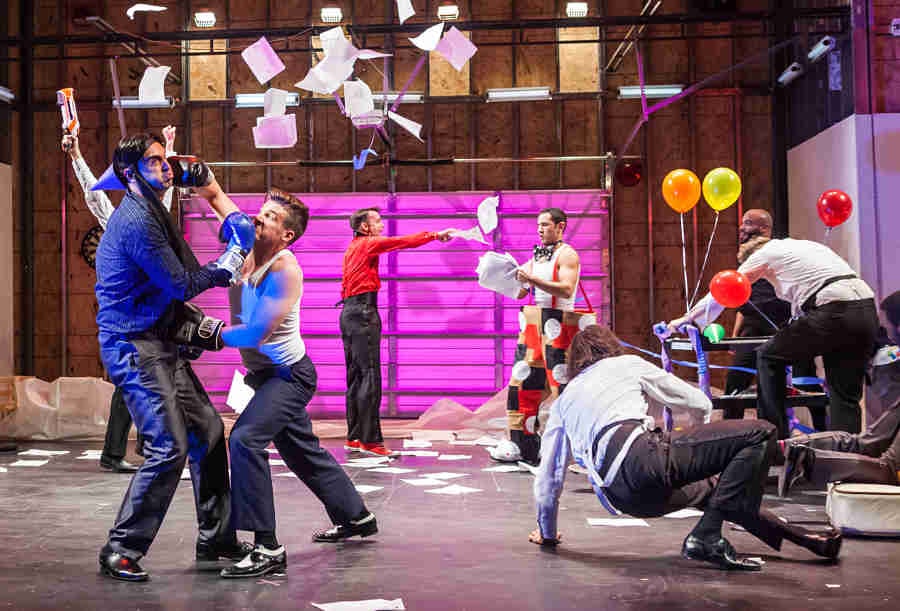In her 10 years in the city, Actors Theatre of Louisville managing director Jennifer Bielstein has become one of the public faces of the organization. It’s not just that she’s at every opening night, giving the curtain speech alongside artistic director Les Waters, thanking the community for believing in their work. She’s also a tireless arts advocate around Louisville, always out and around—not only at the flagship arts events but in the audience of small theatrical productions, at local music festivals, and storefront gallery openings. Bielstein’s work isn’t just keeping the lights on at Actors Theatre—it runs on relationships, and she tends them with a quiet, friendly passion.
Now, it feels like the end of a mini-era. Bielstein came to Louisville in 2006 from Chicago, where she worked for the acclaimed Writers Theatre, About Face Theatre, Apple Tree Theatre, and Steppenwolf Theatre Company. She’s leaving in April to become managing director for the Guthrie Theater in Minneapolis, where Joseph Haj took the reins last summer after artistic director Joe Dowling retired.
Bielstein is no stranger to transitions, having joined Actors after the retirement of long-time executive director Alexander “Sandy” Speer, who had been with the company since 1965 (Speer passed away in 2011). She served through two artistic directors. In the final weeks of her tenure here, there’s an air of finality in the air, and also a sense of quiet accomplishment.
She’s earned it. During her decade-long tenure in the city, Bielstein has helped the theatre weather the Great Recession; turned the building’s dormant restaurant space into Milkwood, a hot dining destination run by Louisville-based celebrity chef and author Edward Lee; expanded the local footprint of the annual Humana Festival of New American Plays; and even changed the way we drive downtown.
Oh, and on the day of our meeting, it’s an opening night—Amy Herzog’s 4000 Miles. If it wasn’t obvious already, Bielstein has to keep a lot of parts moving at once.
What is your biggest concern on opening night? What’s the thing that’s on top of your mind?
I operate with a sense of the whole. I don’t think of an organization divided into an artistic side and an administrative side. So I am always excited to see the play come together fully, and am keyed into if there are any challenges that have caused us to be delayed or if there are any concerns out there. And then it’s about hosting and celebrating the opening.

What is in your wheelhouse that might surprise people to know that you’re responsible for?
I think generally people don’t understand the complexity of our business—that we operate a 375,000-square foot physical plant, and run a parking garage, publish two books annually, have a restaurant. All of the moving parts—150 staff members. 40 apprentices and interns, another 100-plus artists we work with throughout the season, and 1,000 volunteers. All of the stakeholders. And then the hundreds of community partnerships that we have. Every day is so different.
You came on in 2006, right after Sandy Speer retired. What was that like?
He had been here for 40 years, so they were big shoes to fill, in terms of expectations and the work he had done, with [long-time producing artistic director] Jon Jory and then Marc [Masterson], who was still here. So it was great to come into what was already a strong organization, and well-respected locally and nationally, and have the opportunity to build on that.
I think I didn’t really know as tangibly how much change is required, and how much change management is required, when replacing someone who had that kind of tenure. The operations of an organization are so in their head and in their DNA because they’ve been doing it for decades. I see it as only an opportunity for an organization, because I can come in and say, ‘Well, why do we do it that way?’ And ensure that we have reasons behind our choices, and if we didn’t, to work with staff to adjust, or to put a system in place.
That first year, and that’s really a throughline of my work here, I felt it was very important for me to focus on building relationships and building credibility and confidence, because people would certainly be concerned: Sandy has been here 40 years, how will we survive without him? He was able to develop those relationships over that period of time, and I felt in order to quickly ensure that kind of confidence that I needed to develop those relationships quickly.
So what was your biggest challenge in that first year?
I can say that the way I approached it was to have small meetings with groups of staff from all the different departments and ask them what worked, what wasn’t working, what ideas they had. I did the same with the board members and volunteers. And you know how things work in Louisville—I was invited to a lot of lunches and dinners and conversations [where] I asked the community in general what they were hoping for from Actors Theatre, and I took that input seriously and methodically.

What were some changes that came out of that work?
One of the big ones from the community was people felt the Humana Festival wasn’t for them; it was for people from out of town. So we did many things to turn that around, and I am pleased that we did so pretty quickly. The Humana Festival used to start quietly, and end with a bang on these final couple of weekends with the out-of-town industry guests. So we created a large community celebration at the top of the festival—because it runs five to six weeks, it’s not just about those final weekends—and take the companies of shows out to bars and restaurants so people can meet the actors. We hold a press conference with the playwrights to showcase them as the rock stars that they are. They are rock stars in the American theater, right? And the community didn’t have access to them the way we wanted them to.
We tried also to position the festival as—because schedules are so complicated for the consumer—to say, try one of the shows. It’s about you seeing this new work, about us getting your feedback, about the playwright learning from the audience’s reactions. Pick a night you can come and just see what we have going on, versus it being about everybody asking, “So what’s the one show I have to see?”
It’s increased attendance for the festival and created more general excitement around it, and ownership of it, locally.
And then not two years after you joined the staff, the economy bottomed out, which was a challenge for arts organizations across the country.
I feel we navigated the recession well. I feel that we put all of the tough choices on the table and rallied as a staff and board to say we need to do what’s in the best long-term interest of the organization and not just re-trench and pull back. If we want to thrive long-term, we need to commit to the volume of work that we produce, the continued commitment to new play development, and we prioritized what we could do for staff without reducing benefits.
It has delayed me in being able to address some of the larger, key strategic initiatives we needed to address because we didn’t have additional resources. So I’m excited that over the past three years we’ve been able to make some of those investments that I think put us on a strong footing going forward in terms of an integrated consumer relationship software, because we had our data for tickets in one database, for fundraising in another, Humana Festival out-of-town attendees in another, apprentices and interns in another, artists in another.
If you had to name your big achievements here at Actors, what are the things you’re most proud of having pulled off?
Successfully following Sandy Speer into this role is something I am proud of.
And then also some of the work I’ve done collaboratively, locally and nationally in the arts sector, whether that’s with the Arts and Cultural Attractions Council or the League of Resident Theatres. And then there’s the civic projects like getting Edward Lee here to open Milkwood, and the artist housing we’ve worked with the owner of the 300 Building to develop for our artists to have apartments right next door to our theatre.
This is one I know not everyone locally loves, but getting two-way traffic on Main Street when the [basketball arena] KFC Yum Center was going in. The plans then were really significant—any time there was to be an event at the arena, they were going to shut down traffic access at [the intersection of] Third and Main, which would have immediately cut off people’s ability to come here. You probably remember the panic in the community: I won’t go downtown, it’ll be a disaster. It could have crippled our business. I was pleased that we were able to work with the mayor’s office, the department of public works, and Metro police, the arena authority, to do that.
You changed traffic patterns on Main Street. That’s huge.
[Laughs] I’ll put that on my resume. And the fiftieth anniversary—I was really excited to be here in this role of our fiftieth anniversary because that’s such a milestone.
The Humana Festival is such a huge part of Actors Theatre’s organization, and you manage an organization that puts on an incredibly intense festival of full productions of plays in addition to a full season. The Guthrie doesn’t have a new play festival at this point.
Certainly not at this scale.
Is that something they are interested in developing?
It is so early for me to know or say. One of the things that’s exciting for me about going to the Guthrie is with Joe Haj coming in as a new artistic leader, there’s the opportunity to take a fresh look at everything they’re doing. So that would be from programming to all the administrative functions as well, and what that means. I think it’s still early for him, too, to know exactly what that looks like.
The Guthrie has a legendary reputation, but you’re no stranger to that. What specifically makes you excited about working with Joe Haj and this theatre?They’re at this moment of change in artistic leadership. Also, for me it’s an opportunity to challenge myself to operate at another scale—at a budget of almost $30 million and annual attendance of 400,000. I’ve been to Minneapolis four or five times over the last decade, and I’ve always been impressed by the Twin Cities community and the vibrance that exists there.
Also, the Guthrie has set up an interesting model with the impressive facility they’ve opened just over ten years ago, that’s truly a tourist attraction and a community gathering space. I think it will be really interesting to learn how they capitalize on that now and what more it can be.
Erin Keane is an arts critic and reporter based in Louisville.


